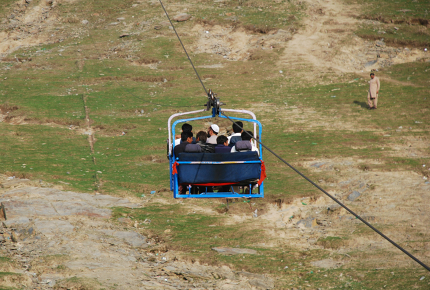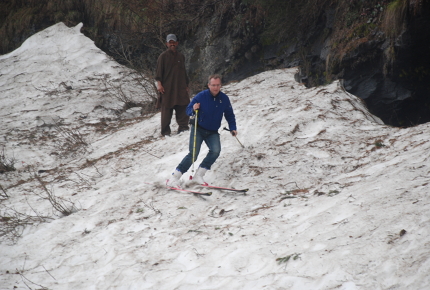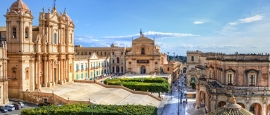Strange skiing: Off-piste in… Pakistan
A decade after being destroyed by the Taliban, Pakistan’s only ski resort is attempting a miraculous recovery. Christoph Schrahe straps on a set of very old skis and investigates the story of Malam Jabba.
We crawl up a narrow, mountain dirt track at a snail’s pace. Army jeeps escort our little convoy. Two guys with machine guns sit on the back. It’s certainly not your conventional journey to a ski resort.
The Taliban don’t rule the Swat Valley anymore, but that doesn’t mean that they have completely vanished. Though if I am to die here, I fear it is more likely to be at the hand of our imprudent driver, who keeps rearing the vehicle perilously close to the crumbling precipice.
I’m heading to Malam Jabba in the Hindu Kush mountain range as part of a small team aiming to provide consultation on the construction of a new ski resort, an ambitious project that takes on more significance given the area’s turbulent history.
I miraculously arrive at Malam Jabba hill station in one piece, and to my surprise find there is a lift operating.
The ‘lift’ consists of a single cable, from which a makeshift gondola dangles. The metallic carriage looks strikingly like the interior of a car; all eight passengers sit on faded felt chairs facing the same way, their heads press up against rectangular headrests. Powered by an old car engine, the haul rope touches the ground in the middle of the track, so anyone getting too close risks losing their head – even with no Taliban around.
Watching the cable car sway perilously in the wind, it’s hard to imagine Malam Jabba as a thriving ski spot, but it once was.
The Swat Valley thawed into a prominent tourist destination towards the end of the 1990s, a luxurious hotel was erected and tourists flocked to admire the views and escape the prickling city heat.
 The lifts at Malam Jabba are not for the faint-hearted
The lifts at Malam Jabba are not for the faint-heartedChristoph Schrahe
Skiing took off not long after, with competitions held for blossoming professionals. A ski school opened in 2005 that helped amateur locals and domestic tourists take their first shaky slides on the slopes.
But in 2006, resort life came to a crashing halt. Taliban rebels attacked and seized control of the area, banning all ‘un-Islamic’ activities, including skiing. The radical group tore down the existing lift (a gift from the Austrian government) and torched the resort’s only hotel.
Itching to get out on the snow, I join a group of domestic tourists heading up the slope on foot, perhaps wisely opting against a ride on the rickety lift.
When we reach the first snowdrift I pause to watch some of the visitors stuff snow into plastic bags in order to transport it down to the valley, while others begin sliding on jackets, tarpaulin, anything they can get their hands on.
At the summit, a group of local guys wave me over, and to my surprise, present me with a pair of white rear-entry boots.
They’re wet inside, but who cares when it comes to the chance to do some turns in the Hindu Kush?
The skis are long, narrow and with no spring left in them. The bindings are defunct, but with the aid of the friendly rental guy I manage to attach the boots to the skis.
However, after a short 150m (490ft) run, one ski comes clean off and is sent careering down the hill. The rental guys frantically bundle down behind it; after all these decrepit skis provide a source of income for an entire family. I breathe a sigh of relief when the ski is safely recovered.
The Swat Valley, especially the small villages sprawling across the steep slopes above it, is a poor region but its people are fiercely resilient. This is the valley that produced Malala Yousafzai, the youngest ever Nobel Prize laureate who was shot by the Taliban for demanding the right to an education.
Most locals are very proud of her, and they are also in favour of the redevelopment of the resort. It represents defiance against extremism and promises jobs for locals.
 Christoph samples one of the resort's rudimentary runs
Christoph samples one of the resort's rudimentary runs
Christoph Schrahe
Though the redevelopment project is, somewhat dubiously, headed by Khyber Tobacco LTD, the company has also pledged to build a much-needed hospital and a school for girls.
When completed (purportedly by autumn 2016) the resort itself shall feature a 4-star hotel, chalets and a chairlift to the ridge that offers a stunning view of Nanga Parbat.
After my brief cameo on the slopes, I’m informed that our original plans to stay in Saidu Sharif, the closest existing hotel to Malam Jabba, are being altered as Colonel Muhammad Aamir, our security officer, considers it too dangerous to have a group of foreigners all under one roof.
As the sun dips behind the Kush our jeep pulls up at a low-key guesthouse on the mountain.
I’m shown to my basic room and clamber into bed exhausted. A machine gun is leaning on the wall next to my bed.
“Just in case”, states Mr Aamir, as he goes to shut my door, “but we also have two armed soldiers in front of your room’s door, so don’t worry.”
Unfortunately I do worry.
I sink down into my warm duvet and push away fears that, despite a clear appetite for the sport, it will be a long time until conventional skiing returns to the Swat Valley.
NEED TO KNOW
Getting there
Pakistan International Airlines fly direct to Islamabad from London, Birmingham and Manchester. In March 2016, the Khyber Pakhtunkhwa government withdraw the requirement for foreign tourists to secure a no-objection certificate (NOC) before visiting Swat and the Malakand district. However, as of December 2016, the Foreign and Commonwealth Office (FCO) advise against all travel to Swat region. Foreign visitors are required to travel with an armed escort.
Additional information
The ski season lasts from late December until March. A new chairlift, replacing the one destroyed by militants in 2009, was officially opened in the autumn of 2016. It almost doubles the capacity of the previous chairlift, lifting the number of cable cars from 52 to 103.
Where to stay
The Swat Serena hotel (tel: +92 946 711 637; www.serenahotels.com) at Saidu Sharif, 44km (27 miles) from Malam Jabba, offers 49 rooms and suites, Wi-Fi internet access, central heating, flatscreen TVs with international channels and several restaurants.
Planning your own ski adventure?
Check out our ski hub: updated for the 2015/16 season, it provides insightful information on over 100 popular ski resorts, including details on accommodation, nightlife and skiing facilities – makeshift skis optional.
Check out the other features in this 5-part series:
Off-piste in... Georgia
Off-piste in... Afghanistan
Off-piste in... Kyrgyzstan
Off-piste in... North Korea
Do you have any Feedback about this page?
© 2026 Columbus Travel Media Ltd. All rights reserved. No part of this site may be reproduced without our written permission, click here for information on Columbus Content Solutions.









 You know where
You know where